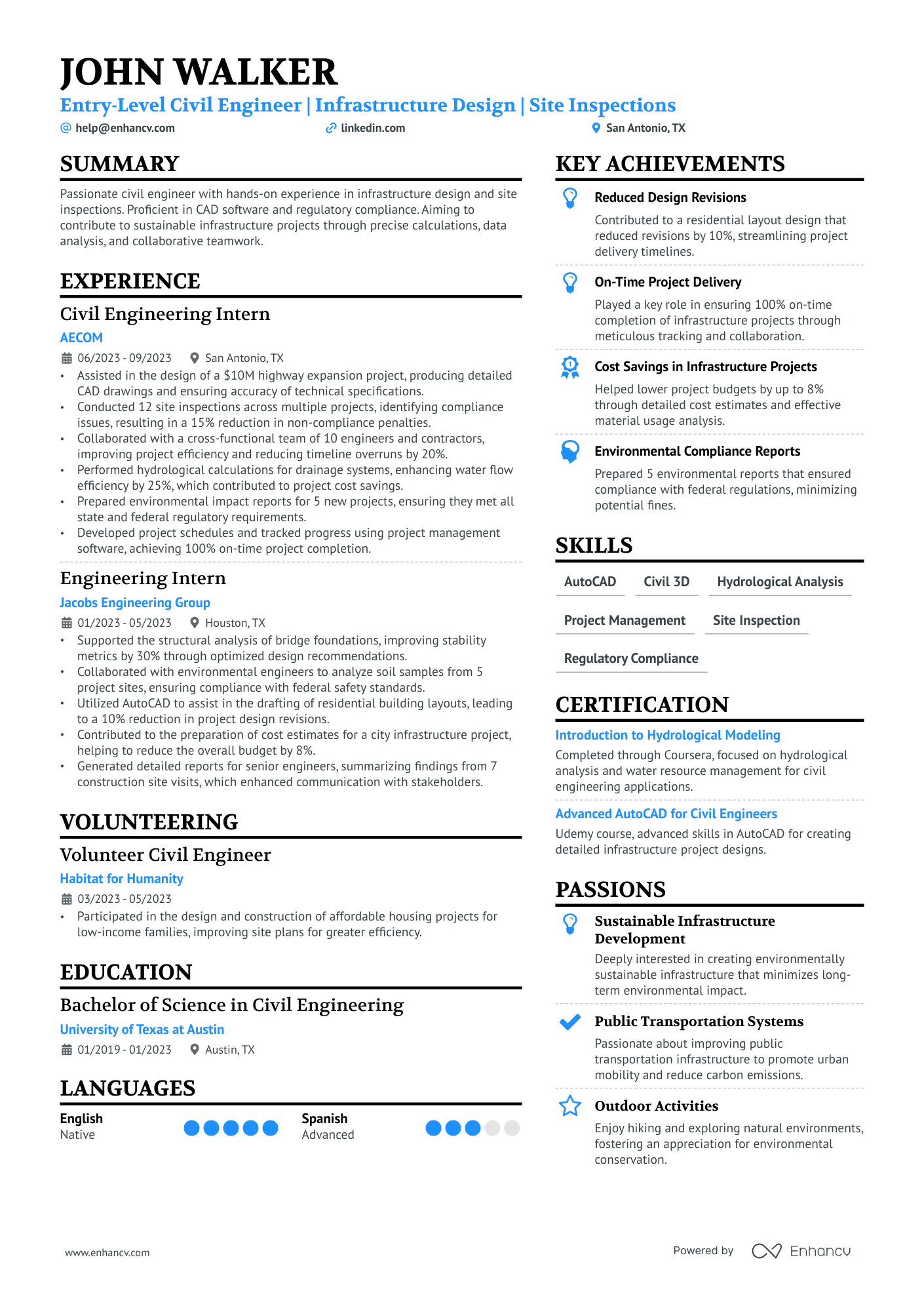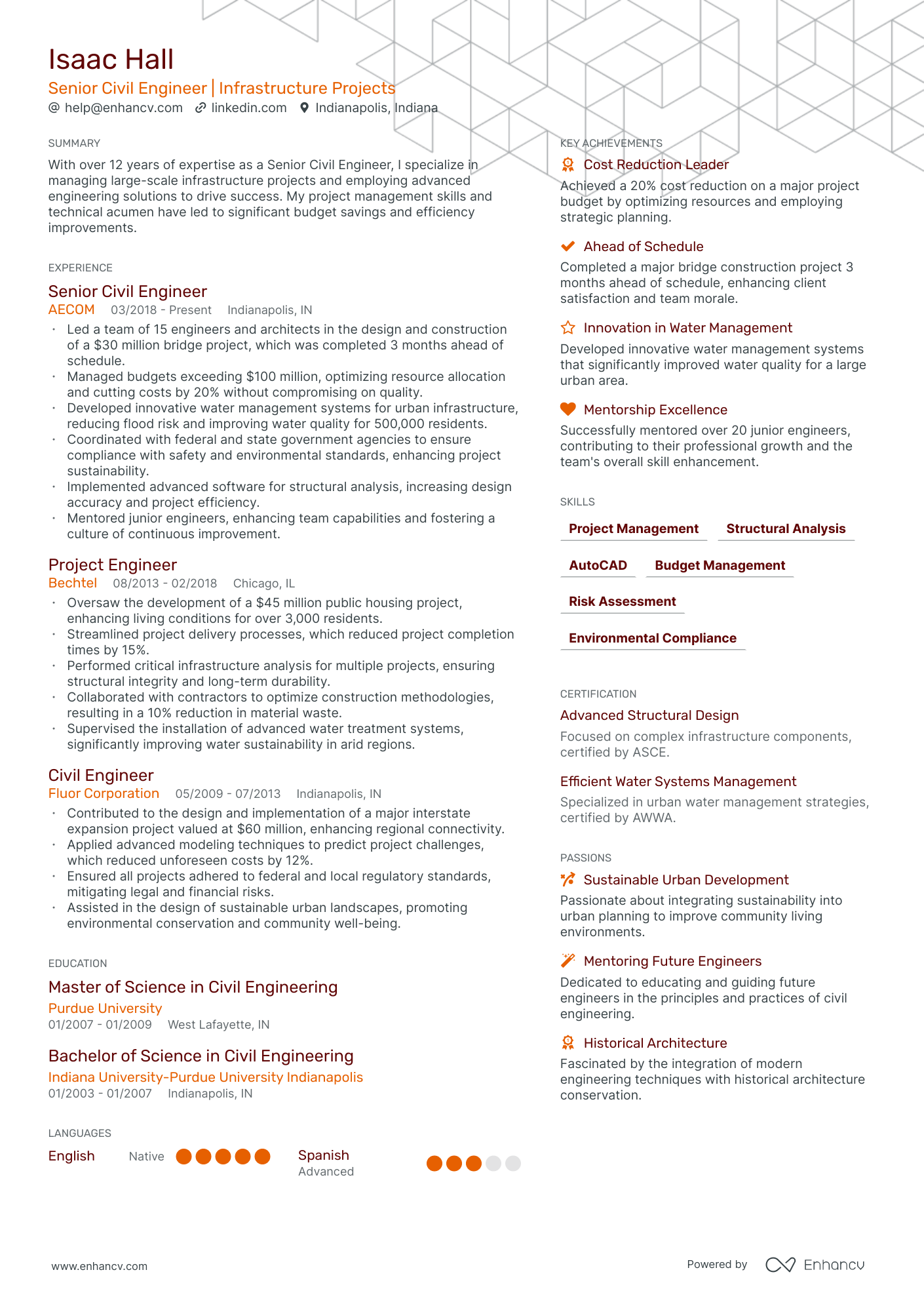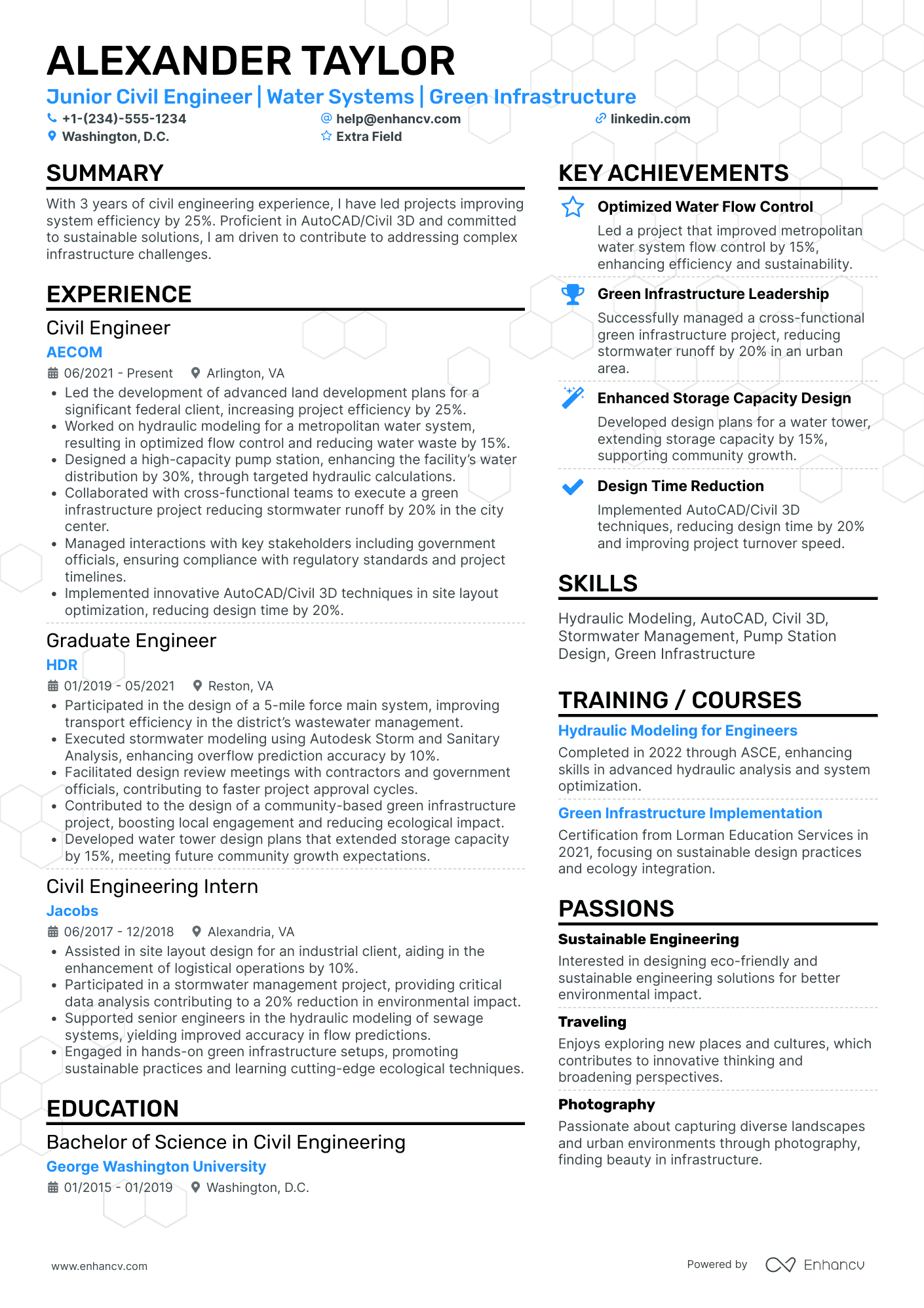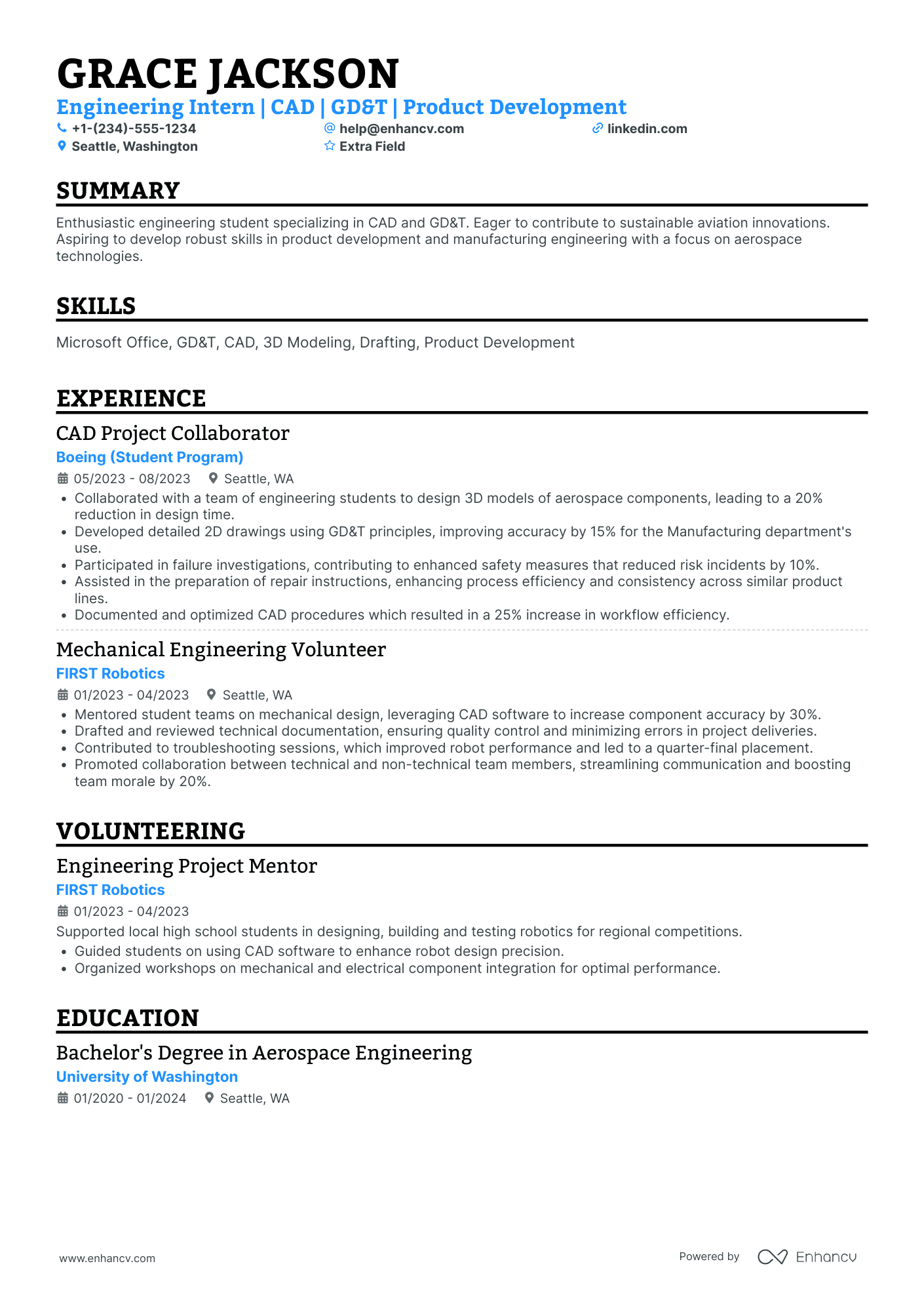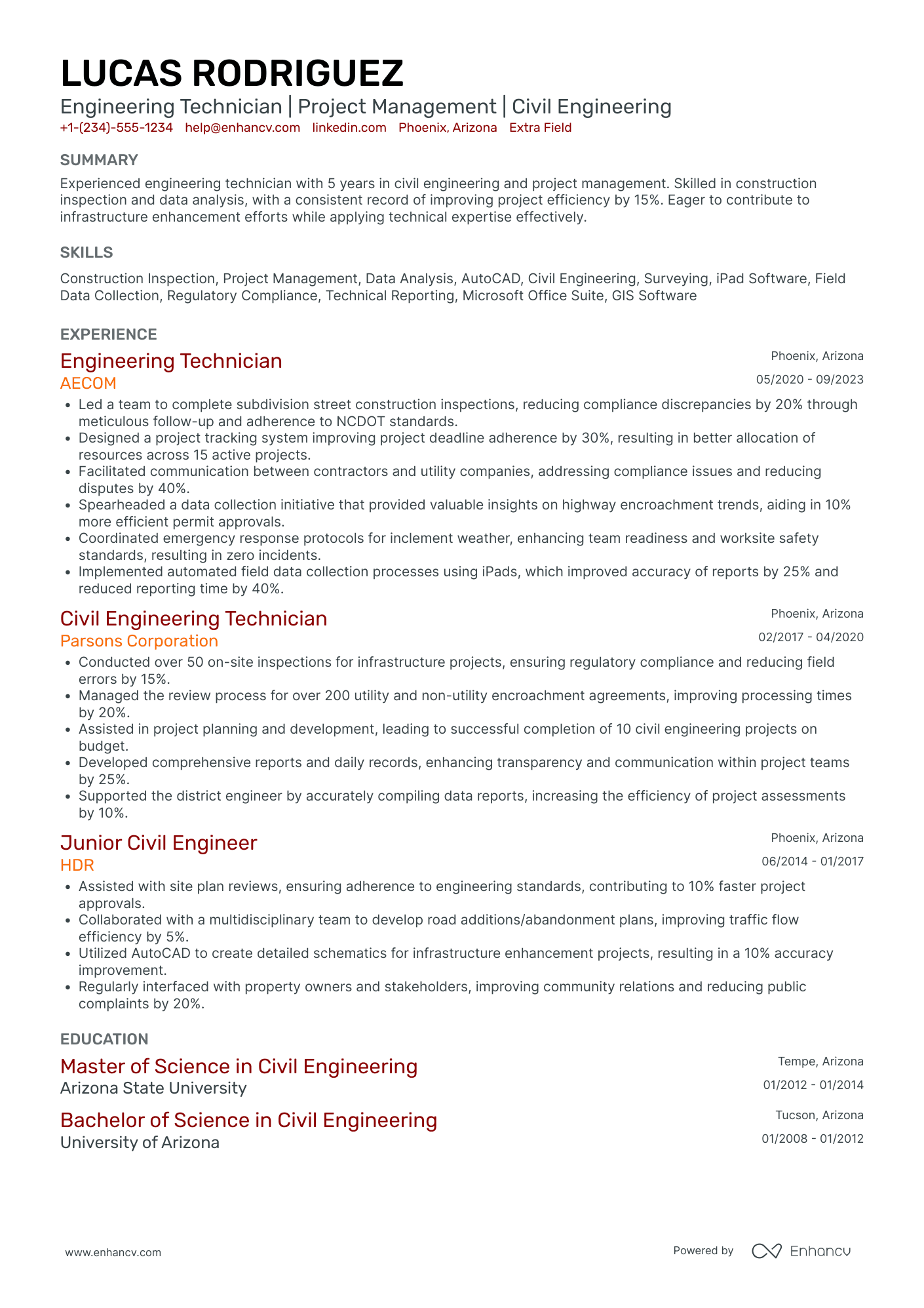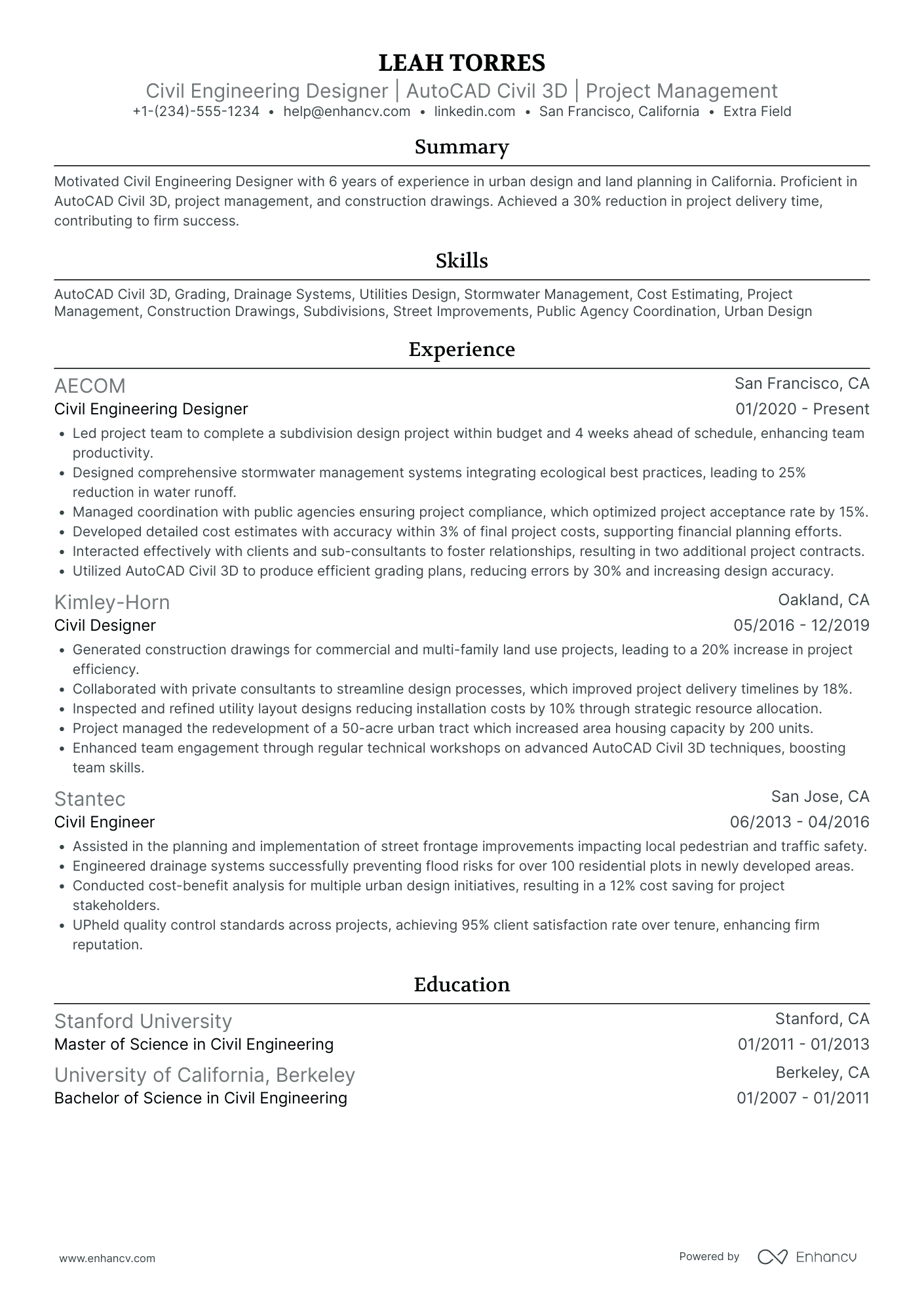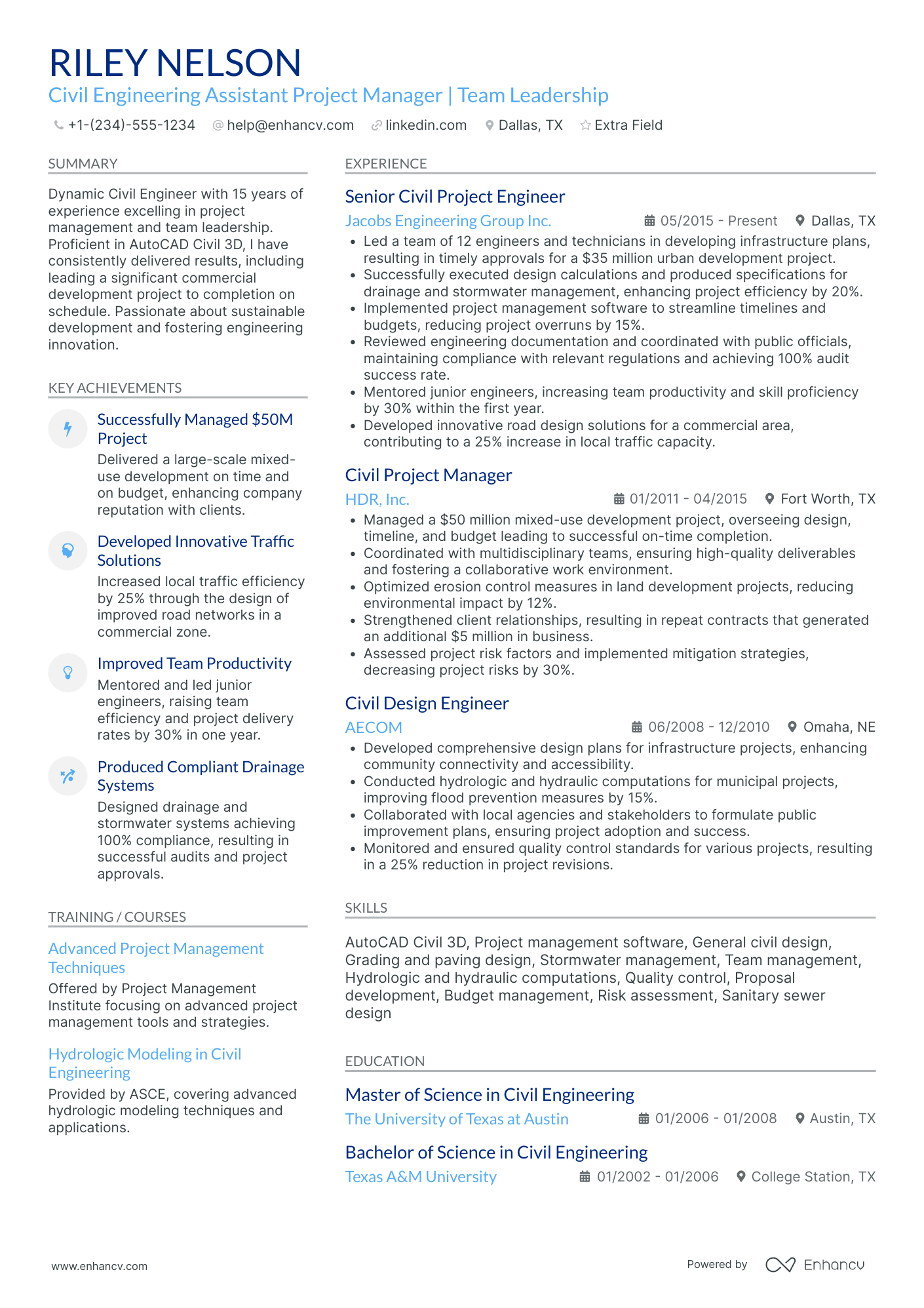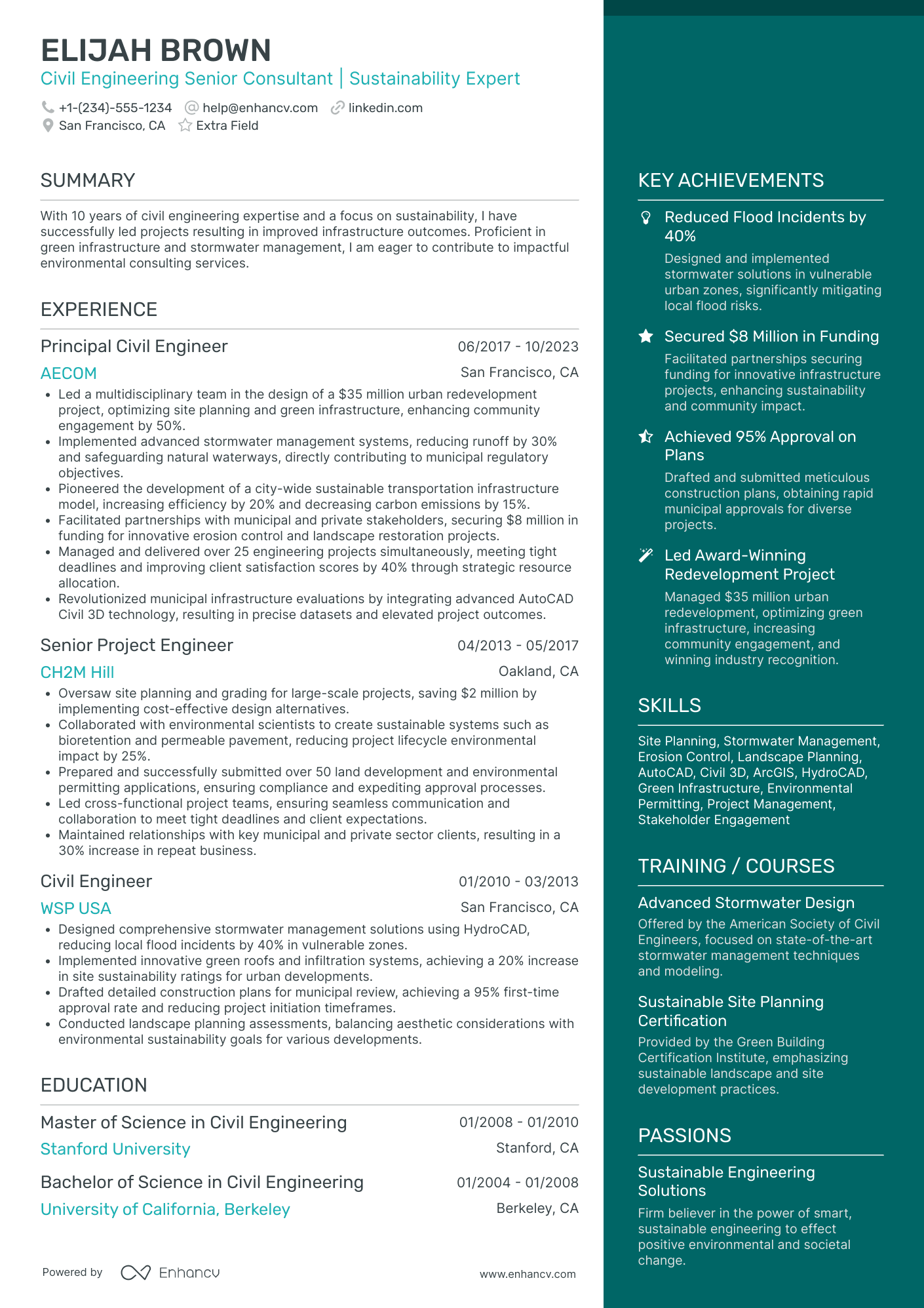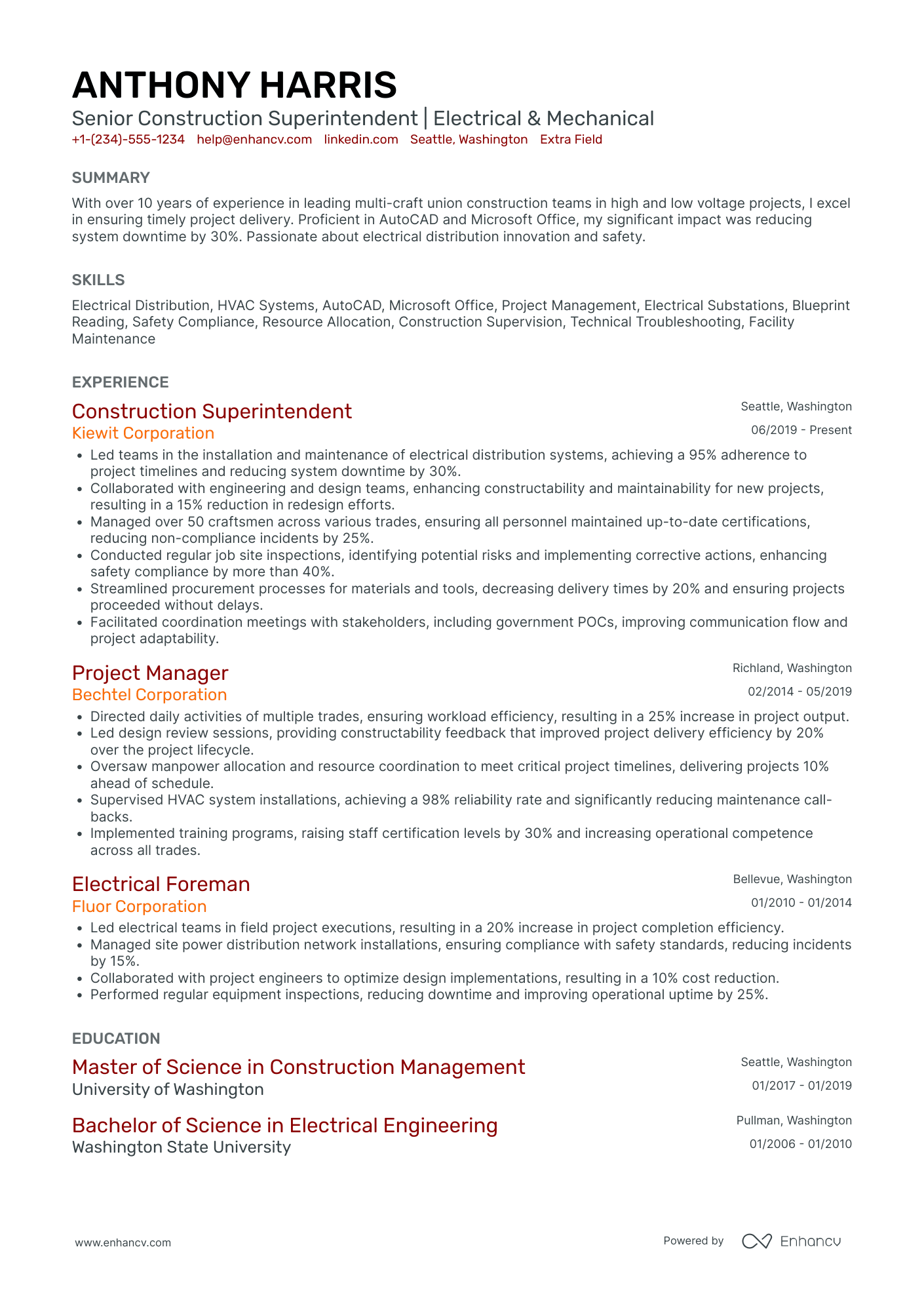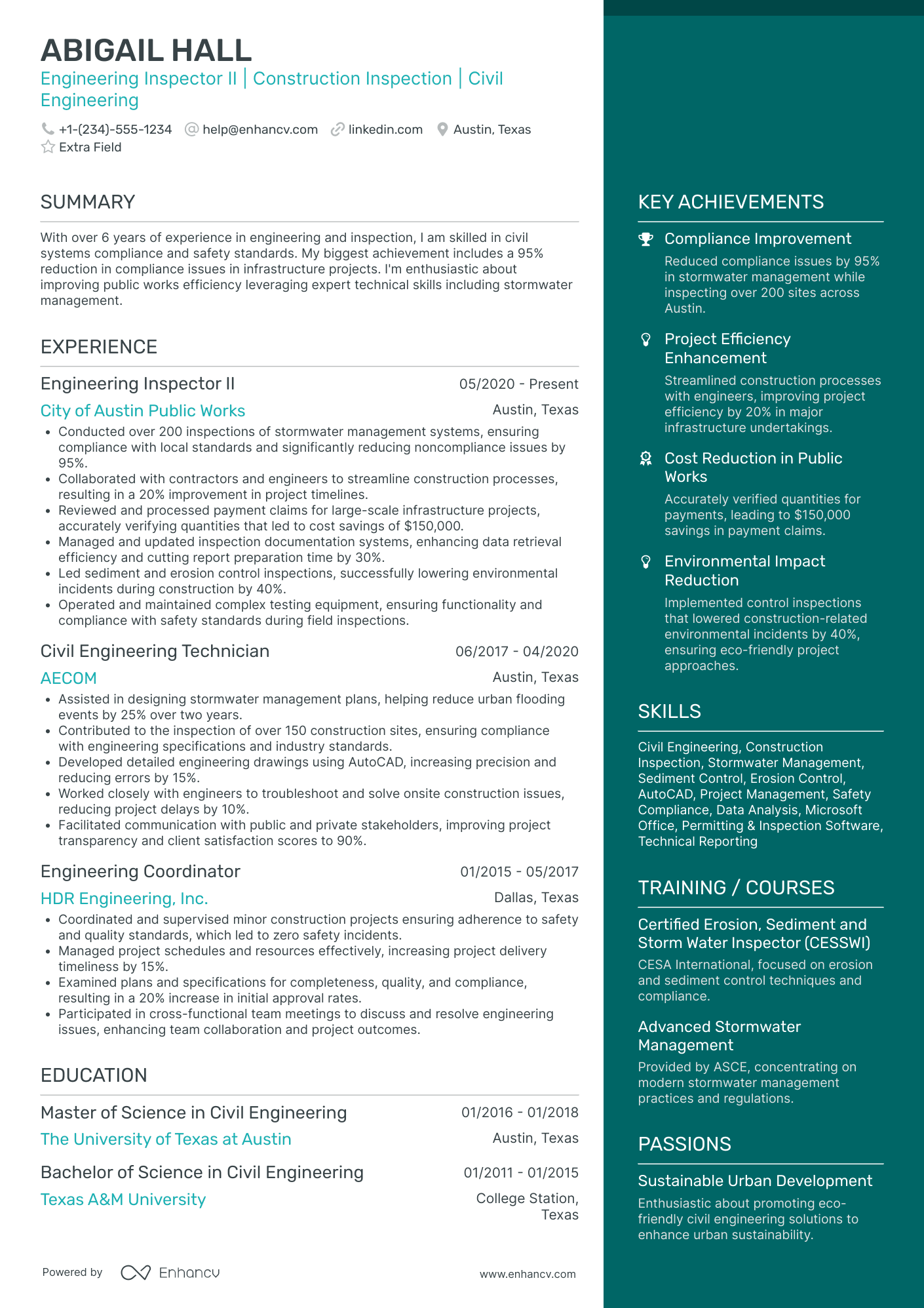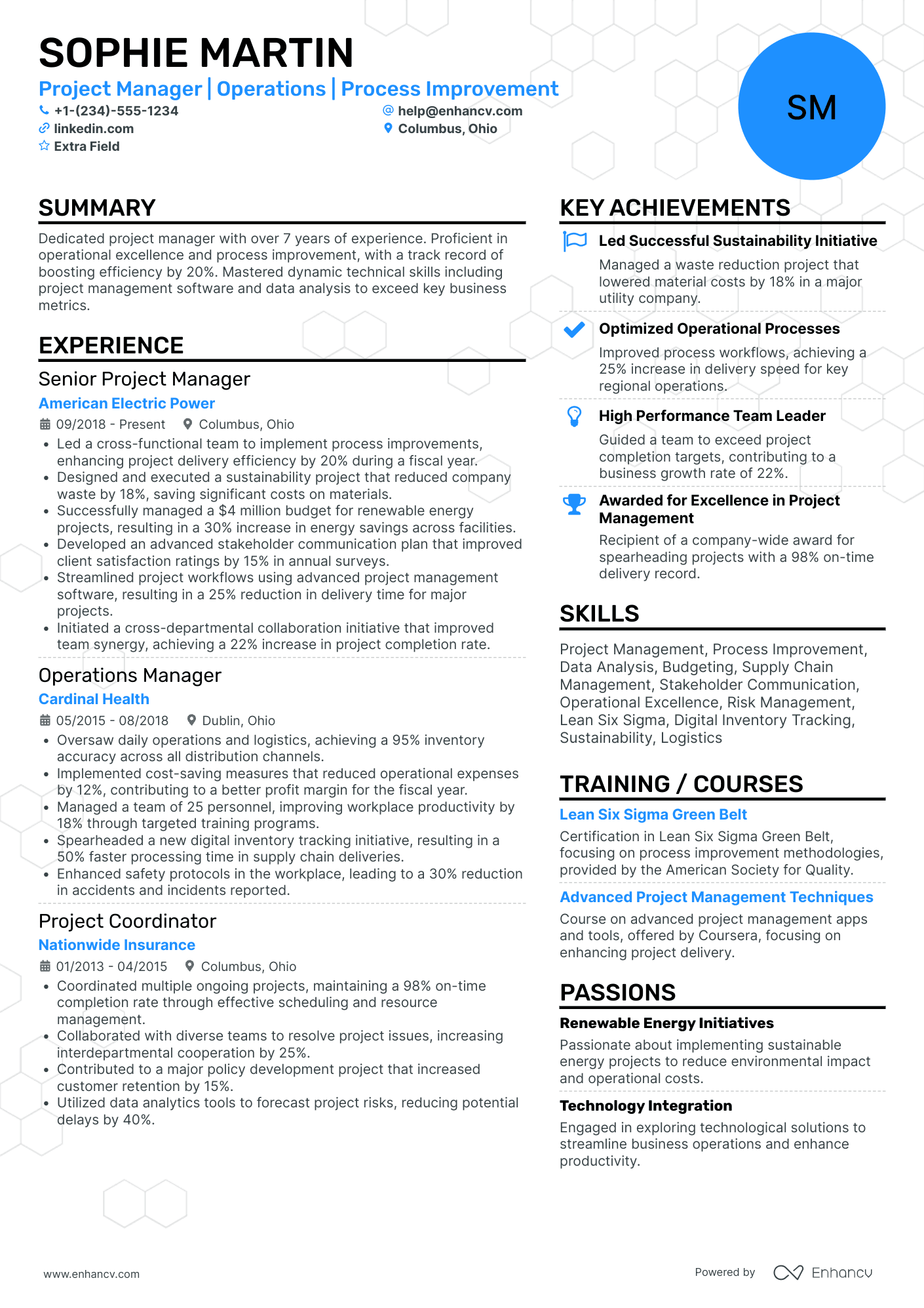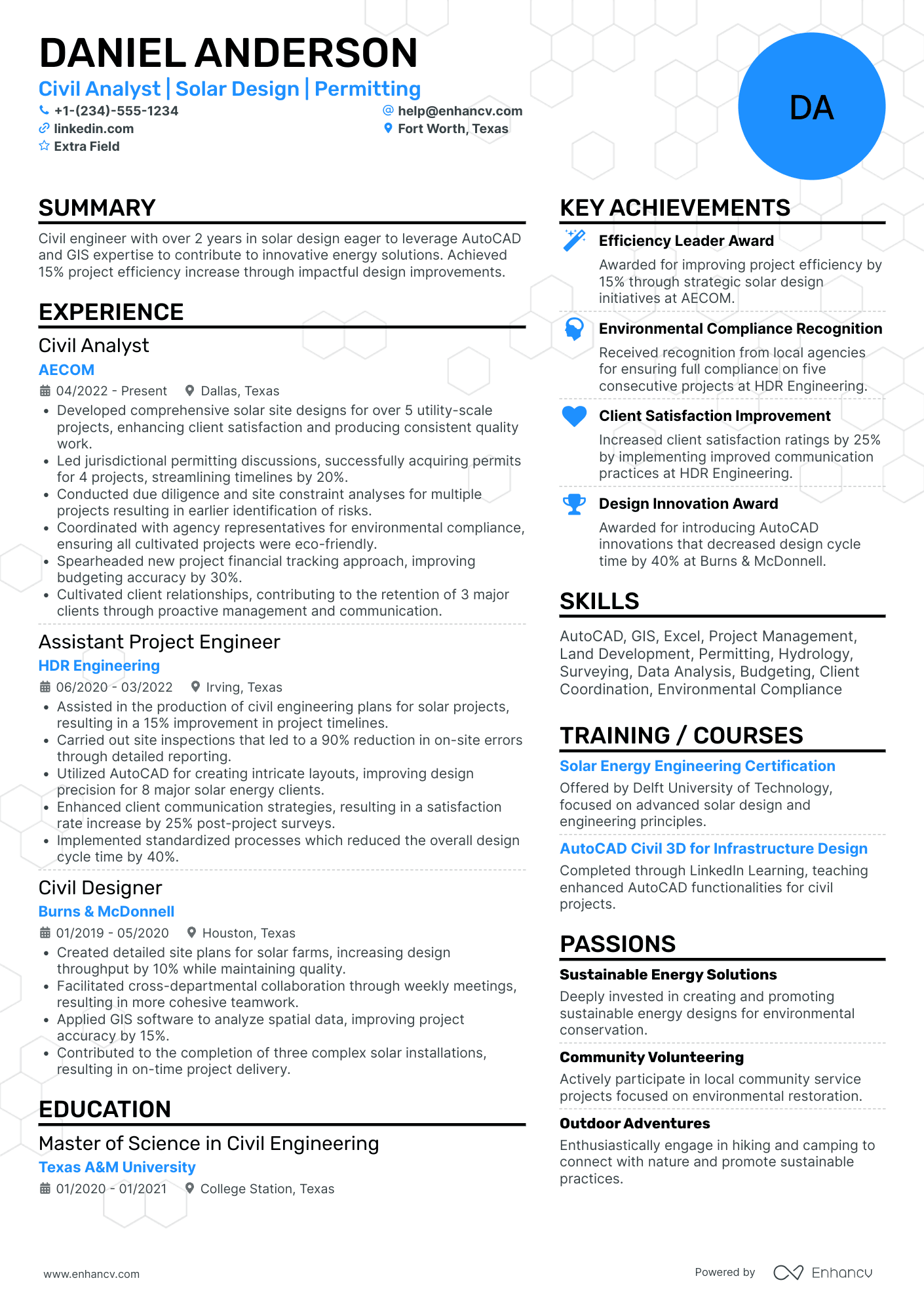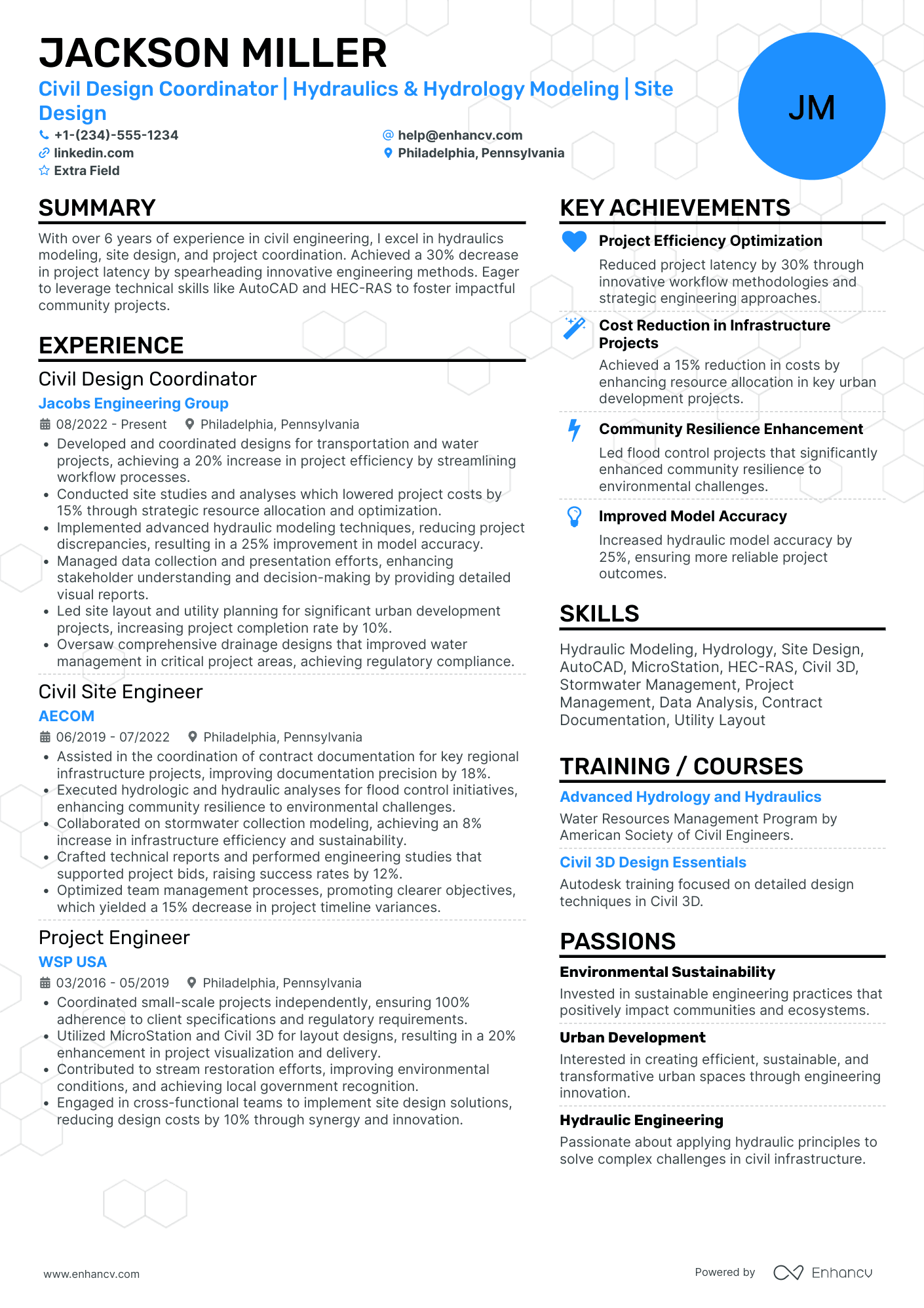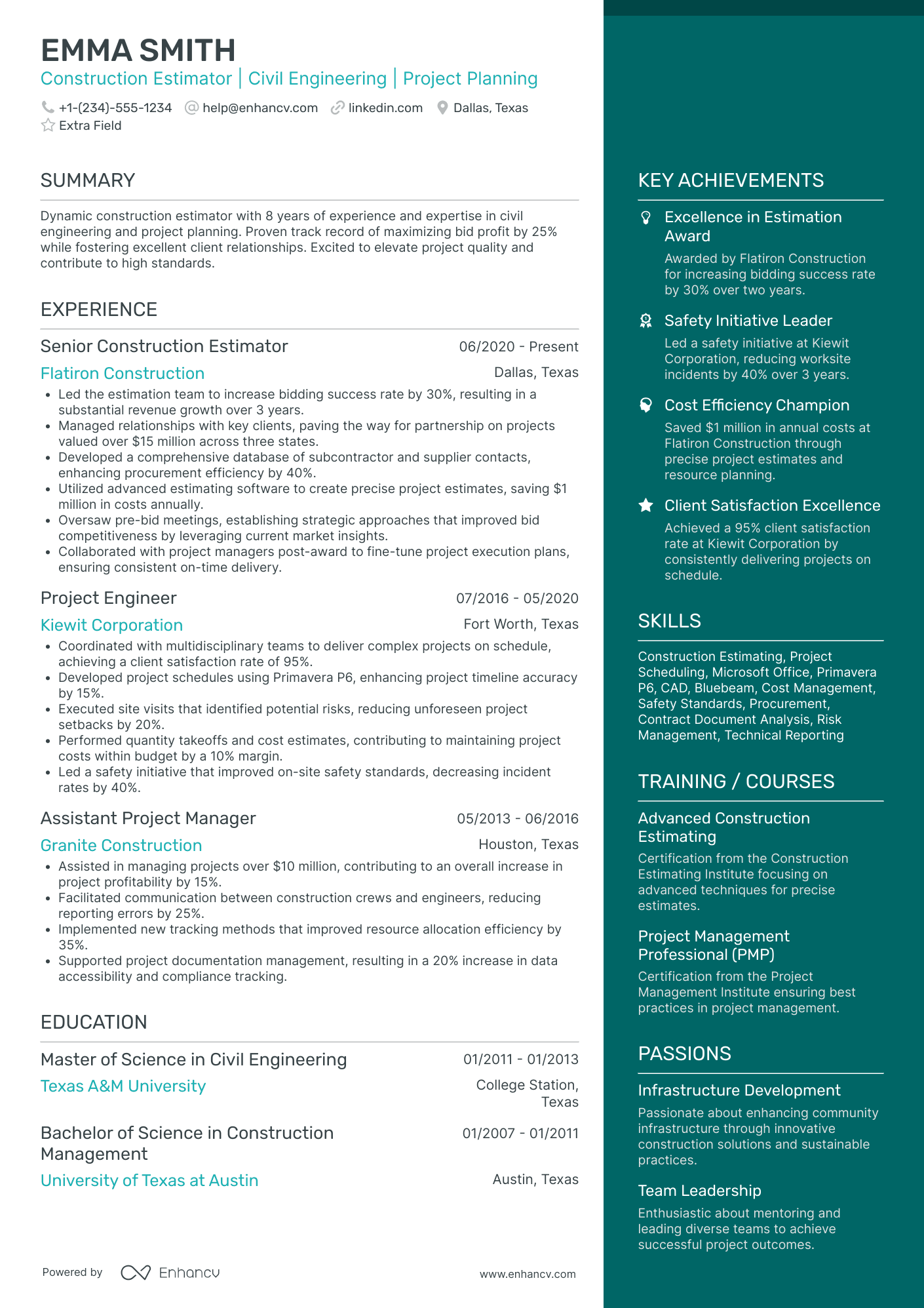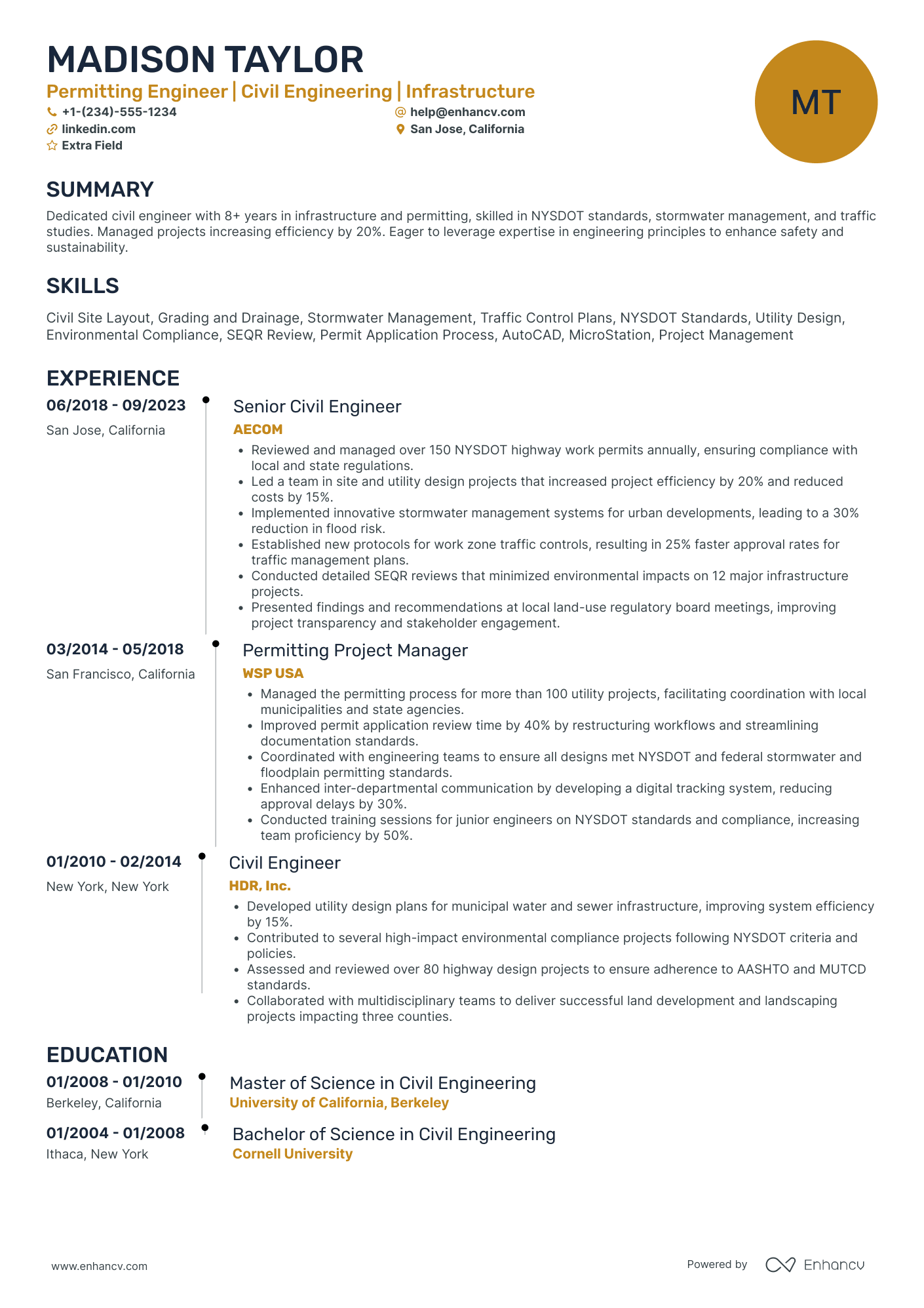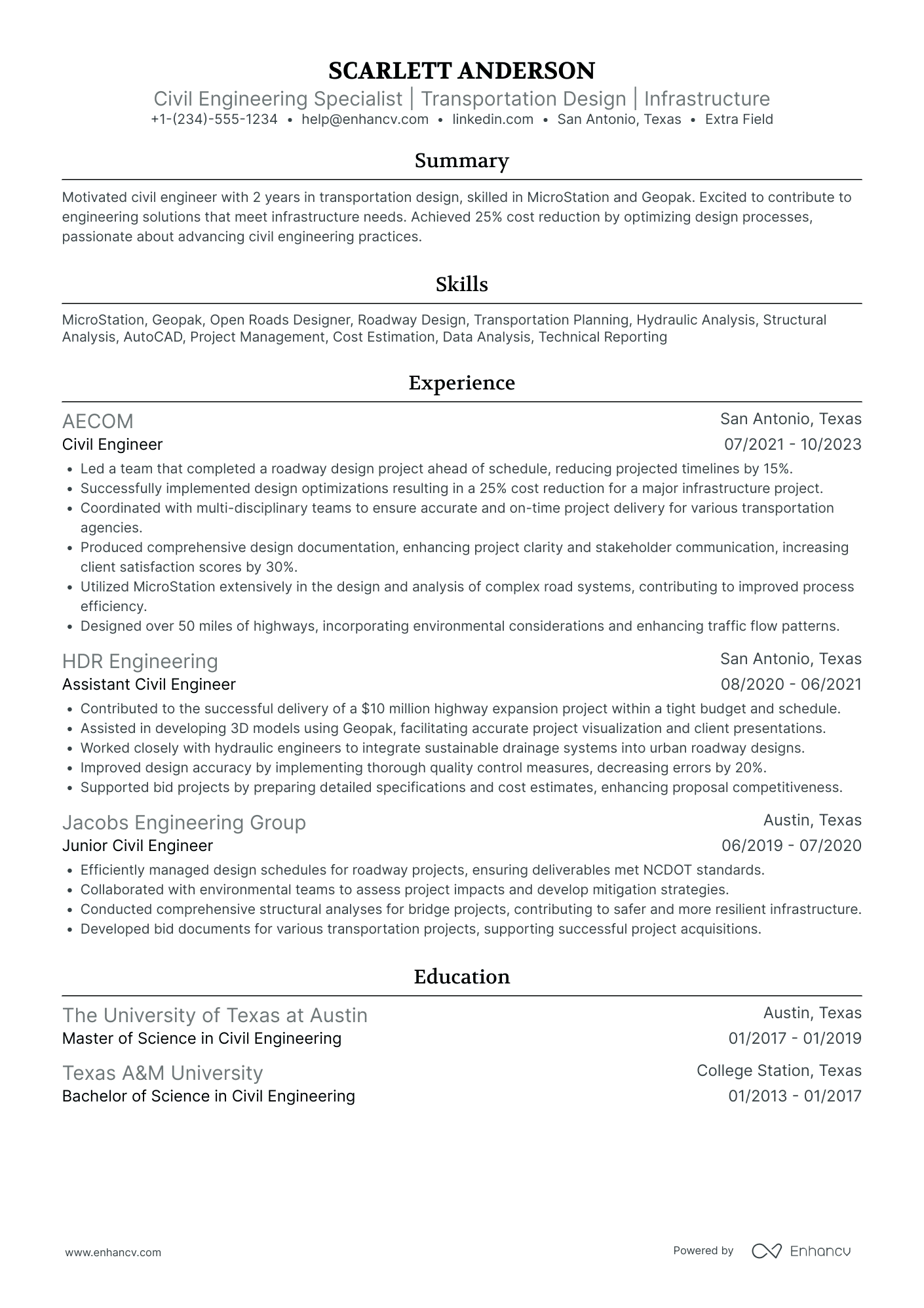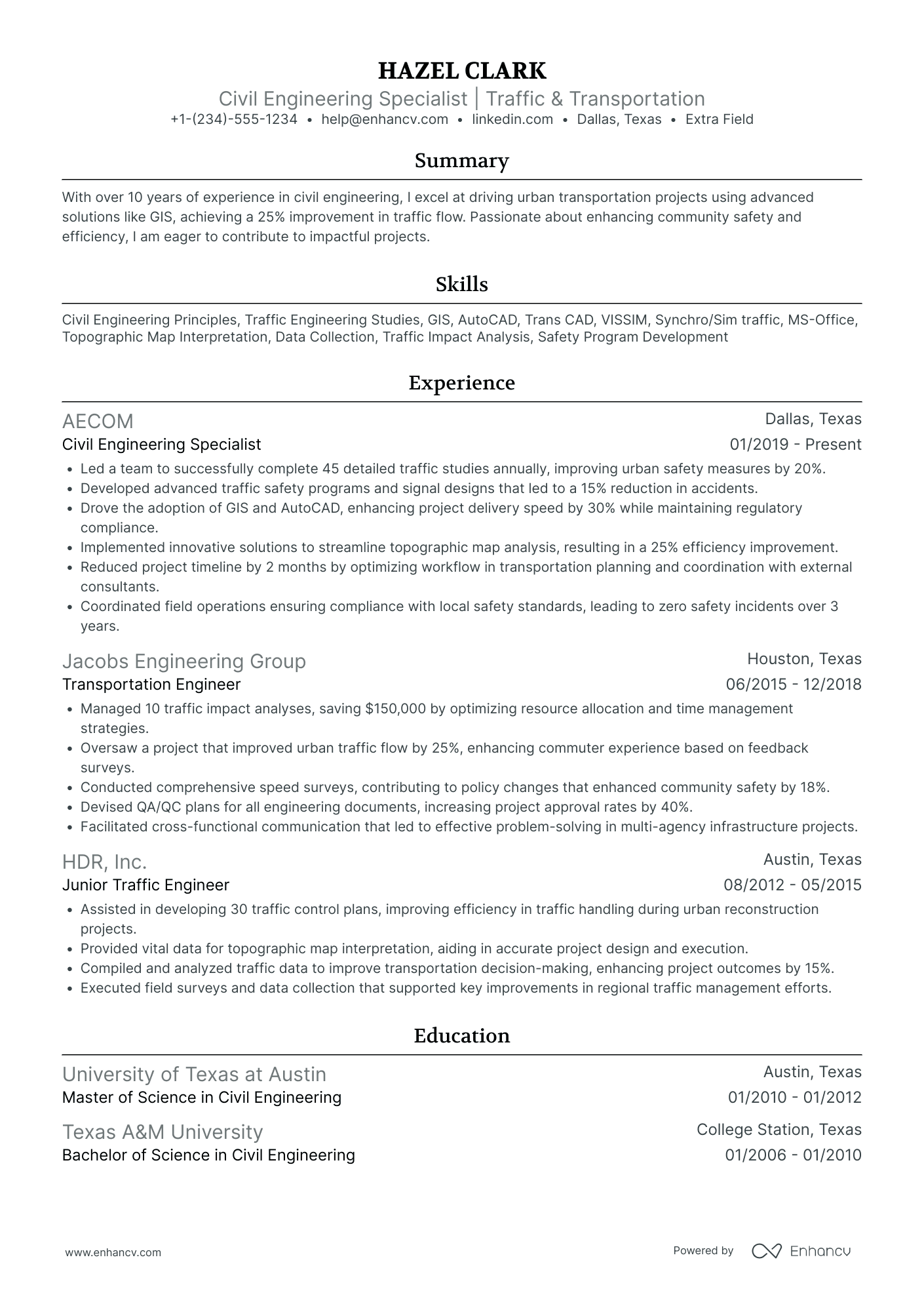Ancient Egyptian engineers built the pyramids to endure for millennia. Their legacy stands as a testament to human ingenuity. Today, civil engineers face a similar challenge: creating structures that last while at the same time protecting our planet. Sustainable building practices, such as adaptive reuse, urban regeneration, and green building design, are crucial.
civil engineers play a vital role in our legacy to future generations. It's more than a job—it's a mission. Your resume should reflect this dedication.
Explore our comprehensive civil engineer resume guide to see how to demonstrate the impact of your work.
Here’s what else we’ll cover:
- Tips on formatting your resume according to your civil engineering experience and goals.
- How to use your experience section to bridge your current career and your next desired position.
- The importance of measurable impact on your resume.
- What a well-rounded skill set for a civil engineer is.
- The importance of relevant education and certifications.
- How additional sections can make your resume shine even brighter.
- Civil engineer example resumes and templates.
Here’s a list of guides related to civil engineering that might be useful:
- Design Engineer resume examples
- Electrical Engineering resume examples
- Structural Engineer resume examples
- Quality Engineer resume examples
- Project Engineer resume examples
- Architect resume examples
- Construction engineer examples
- Entry-level engineering examples
How to format a resume for a civil engineer
Your resume layout is what speaks to recruiters immediately. It can either be a comprehensive map of your experience and skills or an unsolvable labyrinth for the potential employer. Make sure it’s the first, and start by choosing the right format.
Here are the three most common resume formats depending on your needs:
- Reverse chronological resume: It lists your workplaces starting with the most recent. This approach focuses on your professional growth and maintaining a consistent career progression.
- Functional resume: Ideal for those with limited experience or those switching careers. It focuses on your skills and accomplishments rather than your experience.
- Hybrid resume: Confident in both your skills and experience? Try the combination resume, which gives equal weight to both.
OK, you’ve chosen your format, now what? Here are some practical tips:
- Resume length and layout: Choose a layout that will be easy to scan and comprehend. A two-column layout is best—and yes, it’s readable by ATS (Applicant Tracking Systems). Leave enough space between sections, maintain 1-inch margins, and list the information in bullet points for better clarity. The length of your civil engineering resume depends on your experience. Choose a 1-page format if you have less than 5 years of experience, and 2 pages for more.
- Colors and fonts: A splash of color on your resume won’t make it less professional. Consider using a subtle color to highlight section headings or key civil engineer achievements. Use modern fonts like Rubik or Lato and keep the size of the text between 10 to 12 pt, with resume headings a bit larger.
- Header and photo: Your header should reside on top of your resume and include basic contact information, such as name, e-mail, phone number, and job title. A photo is usually not required but check with your specific job posting to be sure.
- Naming and formatting: Use a PDF format to maintain your chosen resume layout across all platforms. To follow naming conventions, include your first and last name, the position you’re applying for, and the word resume. For example, JohnSmithCivilEngineerResume.pdf
Got a resume already? Run it through our 16-point evaluation tool for free!
Different regions expect different formats – Canadian resumes, for example, may look unique.
Is your resume good enough?
Drop your resume here or choose a file. PDF & DOCX only. Max 2MB file size.
The top sections included in your application can vary, but include these to make sure you’ve covered the basics:
The top sections on a civil engineer resume
- Summary section: This gives you an opportunity to highlight your professional achievements and skills related to civil engineering upfront.
- Key skills: This section allows you to list your proficiencies in specific areas such as managing construction projects, designing infrastructural systems, or utilizing specific engineering software.
- Professional experience: This section is crucial as recruiters want to know about your past roles, responsibilities, and the significant impacts you made on the projects you handled.
- Certifications and training: You should include this to showcase any additional professional learning experiences or specific certifications that are relevant to civil engineering.
- Education: This states your degree and educational background related to civil engineering. It provides recruiters insight into your academic qualifications.
Here are the top things recruiters look out for in a resume:
What recruiters want to see on your resume
- Relevant experience: Recruiters prioritize this because they want to see your exposure to civil engineering projects and how you've utilized your skills in a real-world setting.
- Skills in specific software tools: It's vital because many civil engineering tasks such as simulation, design, and project management require the use of specialized software.
- Certifications: Recruiters view this as a demonstration of your commitment to mastering areas of civil engineering above and beyond your basic degree.
- Project management skills: Recruiters value this as civil engineers often have to oversee projects, ensuring they are completed on time and within budget.
- Communication skills: This is important because as a civil engineer, you'll need to explain complex technical details to clients, team members, and stakeholders who may not possess the same technical know-how.
We now have the outline of your resume–in terms of content and design. Let’s look in depth at its main component: your experience.
Civil engineer resume experience examples
Think about your experience section as a bridge between you and the recruiter. It’s a way to connect quickly and effectively with potential employers. Build your civil engineer experience section in such a way, so that you can stand on it confidently.
When crafting this resume component, include examples of civil engineer achievements. Listing your daily responsibilities and the software you use is a good starting point, but it’s not specific enough. Focus on what you brought to the companies you worked for. Incorporate specific examples of goals achieved or teamwork you’re proud of, and, if relatable, how you contributed to sustainability and conservation efforts.
Let’s take a look at a real civil engineer job description.
Job title: Entry-Level civil engineer
Company introduction: We are a leading engineering and materials science consulting firm with a strong presence in the Denver area. With over 45 years of experience, we provide comprehensive services in geotechnical engineering, environmental consulting, construction materials testing, and more. Our team is comprised of dedicated professionals who are passionate about delivering quality solutions to our clients while promoting sustainable and environmentally friendly practices.
Job description: We are seeking an enthusiastic and motivated individual to join our team as an Entry-Level civil engineer. In this role, you will have the opportunity to work on a variety of projects alongside experienced professionals, gaining valuable hands-on experience and mentorship. Whether you're interested in geotechnical analysis, environmental remediation, or materials testing, this position offers a dynamic environment where you can grow and develop your skills. You will also be encouraged to integrate sustainable practices and contribute to our conservation efforts.
Education: Bachelor's degree in civil engineering, Geology Engineering, or a related field
Responsibilities:
- Assist with site investigations, field inspections, and laboratory testing
- Perform data analysis and prepare technical reports
- Collaborate with project teams to deliver high-quality, sustainable solutions
- Participate in client meetings and presentations
- Adhere to industry standards, regulatory requirements, and sustainability guidelines
Location: Denver, CO
And now, two experience section samples. Better not mimic this one:
- •Managed cash register and processed transactions.
- •Restocked shelves and maintained store cleanliness.
- •Assisted with store promotions and sales events.
- •Trained new employees on store policies and procedures.
Here’s why this experience section won’t impress recruiters:
- Unrelated industry: Working in a retail store doesn’t align with the engineering or construction industry. Even if it could relate to the job posting, this example serves no proof of that.
- Skills mismatch: The skills listed (e.g., managing cash registers and restocking shelves) don’t apply to civil engineering roles.
- No technical experience: There is no mention of technical skills or engineering-related tasks, which are crucial for the position.
Now let’s look at an example properly targeted to the job posting:
- •Conducted site investigations and collected soil samples for analysis.
- •Assisted in preparing technical reports and project documentation.
- •Participated in field inspections and environmental assessments.
- •Collaborated with senior engineers on geotechnical data analysis.
- •Supported client meetings by presenting findings and recommendations.
- •Implemented sustainable practices in project planning and execution.
This civil engineer experience section sample is much better:
- Concrete engineering experience: Tasks such as geotechnical data analysis and environmental assessments demonstrate practical, hands-on engineering experience.
- Sustainability focus: Highlighting the implementation of sustainable practices shows a commitment to environmental conservation, which is increasingly important in civil engineering.
- Professional development: Collaborating with senior engineers and participating in client meetings highlights valuable professional growth and teamwork skills.
Another great way to demonstrate your civil engineering achievements is through measurable impact. We’ll explore some ideas on how to present it in our next section.
PRO TIP
Tailoring your resume to the job description draws attention to your relevant skills and experiences. By aligning your qualifications with the employer's needs, you increase your chances of landing an interview and securing that coveted civil engineering job.
How to quantify impact on your resume
Quantifiable impact on your resume is important, as it immediately captures attention. It gives specificity to your responsibilities and accomplishments. Civil engineering is a results-oriented field where the impact of your work can be measured in concrete terms.
Think project size, budget handled, or efficiency improvements. When you list measurable results on your resume, you demonstrate the effectiveness of your engineering skills and experience.
Here are some ideas on what to include:
- Mention the cost savings from the projects you've implemented: Recruiters will understand your focus on budgeting and efficient resource usage.
- Highlight the shortened project completion time due to your strategies: This will show your capability in planning and coordinating tasks effectively.
- Include the increase in project quality index during your tenure: This statistic will convey the positive effect of your work on project execution.
- Specify any reduction in safety incidents after you enforced safety protocols: This displays your commitment to preserving workplace safety and your management skills.
- Describe the decrease in downtime caused by your streamlined operation methods: This shows your ability to tackle productivity issues and carry out successful optimization.
- Indicate the increase in compliance rate during your oversight: This validates your understanding of legal and industrial regulations and your responsibility to enforce these.
- Report the increase in sustainability rating thanks to your green approach: This will impress recruiters who value environmentally conscious candidates.
- Include the rise in client satisfaction rate during your projects: This indicates that you can successfully meet clients' needs and maintain good business relationships.
It’s a no-brainer that it’s much easier to write your experience section when you have experience. But what if you don’t?
How do I write a civil engineer resume with no experience
Direct experience greatly impresses recruiters, but your resume can be compelling even with little to no experience in civil engineering. Focus on your education, skills, and accomplishments that can relate to the specific position you’re applying for.
There’s nothing I believe in more strongly than getting young people interested in science and engineering, for a better tomorrow, for all humankind.
Bill Nye
Build your entry-level civil engineer resume by crossing these off your checklist:
- A strong objective: Clearly outline your career goals, highlighting what you can do for the company. Emphasize your desire to learn and contribute.
- Relevant education: A degree in civil engineering or a related major is crucial. Draw attention to the institution you graduated from as well as any honors or distinctions. Don’t forget to mention relevant coursework, such as courses in structural analysis, fluid mechanics, or environmental engineering.
- Projects: Any academic projects that relate to civil engineering are welcome. Describe the process, the project goal, your role, and the outcome.
- Transferable skills: Highlight relevant technical skills, such as proficiency in AutoCAD, Civil 3D, or other industry software. Soft skills, such as collaboration or teamwork, will also influence how much your resume gets noticed.
- Internships or volunteering: Volunteering, particularly with organizations like Engineers Without Borders or local community construction projects, can also be very relevant. As for internships, even if they’re unrelated to civil engineering, they can still work on a resume. Simply emphasize transferable skills.
- References: Although typically not listed directly on the resume, be prepared to provide references from professors, mentors, or others who can vouch for your abilities and character.
Building on your experiences, describe your skills effectively to show your unique contribution to every work project.
Hard and soft skills on your resume
A polished skill section on your resume is a powerful insight into what you can bring to the company. This is one instance where you can tailor your civil engineering resume to the job description. But what are the main components of a skill section?
It comprises two large sets of skills—hard and soft. Hard skills for civil engineers include using software like AutoCAD, understanding structural safety, and knowing materials science. These are crucial for turning designs into safe, functional structures.
PRO TIP
Implementing sustainable construction methods, and ensuring site safety demonstrates your commitment to modern, responsible engineering practices. These skills are essential for aligning your projects with sustainable development goals and maintaining a safe work environment.
Soft skills are your people skills. For civil engineers, they include things like communication, problem-solving, and teamwork. Engineers must be able to convey complex technical information to non-engineers, collaborate with professionals from other disciplines, and negotiate with stakeholders.
A well-rounded combination of hard and soft skills on your resume for a civil engineer usually distinguishes outstanding engineers from competent ones.
Take your pick from these hard skills:
Best hard skills for your civil engineer resume
- Structural engineering
- Surveying
- AutoCAD
- Civil 3D
- Mathematical modeling
- Hydraulics
- Geotechnical engineering
- Soil mechanics
- Project management software
- Reinforced concrete design
- Water resources engineering
- Construction project management
- Quality control
- SAP2000
- Sustainability design
- Drainage design
- Steel structure design
- Material selection and use
- Road and highway plan design
- Building codes knowledge
Considering adding some of these soft skills to your civil engineer resume:
Best soft skills for your civil engineer resume
- Problem-solving
- Time management
- Collaboration
- Communication
- Leadership
- Decision making
- Negotiation
- Adaptability
- Project management
- Teamwork
- Critical thinking
- Initiative
- Active listening
- Stakeholder management
- Conflict resolution
- Patience
- Creativity
- Attention to detail
- Stress management
- Diplomacy
Your education section is a good place to showcase and give examples of your abilities. Keep reading to find out how to create it.
How to list your certifications and education on your resume
Even if the education section takes up little space, it’s crucial for a civil engineering resume.
A degree in civil or mechanical engineering, preferably obtained from an institution accredited by ABET (Accreditation Board for Engineering and Technology), will qualify you for professional work. When listing your degree(s), make sure you focus on the following key points:
- Title and level of degree
- Year of your graduation
- Institution and state which issued the degree
Here’s an example of a well-written civil engineer education entry:
- •Graduated cum laude.
- •Achieved Dean’s List honors in six semesters.
- •Relevant coursework: Structural Analysis, Fluid Mechanics, Geotechnical Engineering, Environmental Engineering.
- •Participated in the Solar Decathlon competition, designing and building energy-efficient houses.
It works because it mentions:
- Prestigious academic credentials: Graduated Cum Laude from Purdue University, known for its top-tier engineering programs, consistently achieving Dean’s List honors.
- Specialized expertise: Completed essential coursework in Structural Analysis, Fluid Mechanics, and Environmental Engineering, preparing for complex engineering challenges.
- Hands-on project experience: Led a team in the Solar Decathlon to design and construct energy-efficient housing, proving project management and engineering design skills.
If you’re still a student, expand on some of your achievements during your studies—clubs, student awards, events, etc.
But unless you’re still a student or a fresh graduate in civil engineering, don’t go into too much detail about your program and courses.
Now what about certifications on your resume? These always work on a resume, right? Well, yes, but make sure they’re relevant to the job posting. If you decide to get certified, don’t cut corners. Really listen and learn—it’s the only way getting a certificate adds any real value.
Best certifications for your civil engineer resume
Now that we've covered your educational background and certifications, let's pivot to crafting a standout resume summary or objective.
How to write your civil engineering resume summary or objective
A compelling personal statement will capture the essence of your civil engineering expertise. Generally, there are two types of personal statements: a summary and an objective.
A resume summary would look great on your resume for a civil engineer if you’ve got substantial experience. It’s a way to pitch your abilities, demonstrate passion, and emphasize how you match the job description. It ranges from 3 to 5 sentences and can focus on your experience, your civil engineer achievements, or relevant qualifications.
A resume objective is preferable if you’ve got less experience or are transitioning from another career. It’s usually shorter in length: 1–3 sentences, and should demonstrate your desire to expand your knowledge and bring something valuable to the workplace.
Let’s look at two civil engineer summary samples, a bad and a good one.
This one won’t do because of:
- Lack of specificity: The summary is vague and doesn’t specify what types of projects or tasks the candidate has worked on, making it difficult for the employer to gauge their experience.
- Weak language: Phrases like “capable of collaborating" are non-specific and don’t convey confidence or competence.
- Career goals: The statement "looking to grow my skills and take on new challenges" focuses more on what the candidate wants rather than what they can offer to the employer.
And now the improved version:
This civil engineering summary will definitely grab recruiters’ attention:
- Skills and competencies: It highlights key skills such as project management, budget management, safety compliance, and proficiency with CAD software, showcasing the candidate's broad capabilities.
- Professional collaboration: The summary mentions collaboration with multidisciplinary teams, indicating good teamwork and communication skills.
- Problem-solving: It references the ability to conduct site inspections and promptly resolve issues, demonstrating proactive problem-solving skills.
And here’s a resume objective tailored to the civil engineering job posting we considered in the experience section:
This is a great resume objective that relates to the specific requirements of the job posting and will definitely catch the attention of the recruiters.
Finally, consider these additional sections to further enhance your application.
Optimize your resume summary and objective for ATS
Drop your resume here or choose a file.
PDF & DOCX only. Max 2MB file size.
Additional sections for a civil engineer resume
Sticking to what’s expected of you is a safe bet, but enhancing your resume with original additional sections can make you stand out from the crowd. Take a look at our suggestions, tailored to the civil engineer position.
- Projects portfolio: This section illustrates your ability to apply civil engineering skills to real-world situations. For instance, you could mention overseeing the design and construction of a $3 million pedestrian bridge, which was completed under budget and ahead of schedule.
- Professional affiliations: Including a membership in a professional organization, such as the American Society of civil engineers, reflects your ongoing commitment to the civil engineering community and your dedication to staying informed about industry trends.
- Publications and research: Publications and research establish your authority and expertise within the civil engineering field. You might highlight a paper you authored. It’s even better if it’s been cited extensively!
- Volunteer work: Including community involvement, such as participating in Engineers Without Borders, illustrates your commitment to using your professional skills for social good.
- Languages: Highlighting multilingual skills, such as fluency in English and Spanish, is particularly beneficial in civil engineering. An instance of language proficiency working to your advantage might be involvement in a multinational project.
How to put an awards and honors section on your resume
Even if you pride yourself on your modesty, if you’ve got awards or honors in your civil engineering career, don’t forget to include them.
Here’s an example:
Key takeaways
It’s at the core of the civil engineering profession to make things better than they were before. Here’s a recap of our tips on how to make your application more successful than ever:
- Choose a reverse-chronological resume format for an experience-focused resume, a functional layout for a skills-focused one, and a hybrid for a combination of both.
- Your resume layout should be easy to read and comprehend, so opt for 2-columns, 1-inch margins, and use bullets.
- A little color on your resume can go a long way to enhance your strengths, and yes, it will look professional for a civil engineer.
- Your experience section should use keywords from the job description and focus on what value you bring; give specific examples of your achievements, such as project improvements or cost reductions.
- Quantifiable impact always captures attention, especially for results-oriented professions such as civil engineering; highlight metrics like percentage reductions in project costs, time saved on project completion, or increases in project efficiency.
- Include a combination of soft and hard skills to distinguish your application; make your skill section relevant to the job posting, such as AutoCAD, Civil 3D, project management, structural analysis, teamwork, problem-solving, communication, and leadership.
- Your education section should be thoughtful, as it’s crucial on a resume for a civil engineer. Include relevant coursework, certifications, and any honors received.
Civil Engineer resume examples
By Experience
By Role
